There are few words in English as widely misused as ‘ironic’ and ‘literally’. But when you’re writing an essay, accuracy is vital. So we’ve prepared this (pedantic) guide about what these terms really mean!
Ironic (Against Expectations)
‘Ironic’ is now commonly used to mean ‘coincidental’, ‘interesting’ or ‘unfortunate’, such as in:
It’s raining today. Ironically, it rained on the same day last year.
Here, ‘ironically’ is used to mean ‘coincidentally’. But this isn’t the proper meaning of the word.

(Photo: chrismetcalfTV/flickr)
Its actual definition is ‘against expectations’. As such, the sentence above would only be ‘ironic’ if we had a reason to believe that it shouldn’t rain on the same day two years in a row.
A more accurate use of the term would be in a sentence like:
The ironically-named musician ‘Tiny Tim’ was actually 6’ 1” tall.
Here, the use of ‘ironic’ is correct since we’d expect someone called ‘Tiny Tim’ to be small, but 6’ 1” is anything but tiny!

This is also why we say we’re being ironic when we say something we don’t really mean (sarcasm is a form of verbal irony).
There are other forms of irony, mostly related to literature, but all of them draw on this basic sense of going against expectation.
Find this useful?
Subscribe to our newsletter and get writing tips from our editors straight to your inbox.
Literally (In Actual Fact)
Equally misused is the term ‘literally’, which has become a term we use merely for emphasis. Often, this is something figurative, like the following:
I am literally going to die if I fail this exam.
If we heard someone say this, we probably wouldn’t assume that failing would be fatal in a medical sense. Rather, we’d guess they meant that it would have terrible consequences.

The problem with this is that the actual meaning of ‘literally’ is ‘in actual fact’ or ‘exactly’. This is why we refer to dictionary definitions as ‘literal’ definitions.
Technically, this makes ‘literally’ the opposite of ‘figuratively, so using it to emphasise something that isn’t true is very confusing! It would be more accurately used in a sentence like:
You are literally going to die if you lick that poisonous frog.
Here, the speaker literally means that the frog-licker is risking death, not just that it would be unfortunate or embarrassing (although those descriptions would apply too).
Misusing ‘Ironic’ and ‘Literally’
In day-to-day life, most people will know what you mean if you use ‘ironic’ to mean ‘coincidental’ or ‘literally’ to emphasise something figurative. Alanis Morissette even had a hit with a song called ‘Ironic’ that didn’t contain a lot of actual irony (which is literally ironic).
But in formal writing, or if you want to impress a pedant, it makes sense to be careful about how you use these terms. So try not to make the mistakes described above!



